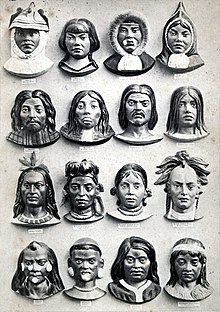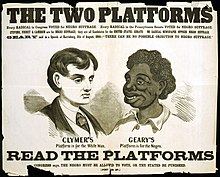
Back Rassisme Afrikaans Rassismus ALS ዘረኝነት Amharic Racismo AN नस्लवाद ANP عنصرية Arabic تفرقه عنصريه ARZ Racismu AST İrqçilik Azerbaijani عیرقچیلیک AZB



Racism is the belief that one race is better than others.[1][2][3] It means judging and treating people badly (e.g., discrimination) because they are from a different race or ethnicity.[1][2]
Racism can affect many parts of society, like laws, cultures, and economies. In extreme cases, it can lead to terrible events like the Holocaust, where certain races were targeted and treated horribly. [4] During the Holocaust, Nazis in Germany believed that some races did not even deserve to exist. These beliefs were racist. Because of those beliefs, they killed many people who belonged to those races. Those actions, which resulted from their racist beliefs, were also racist.
Racism has been around for a long time and has caused wars, slavery, and the creation of nations. It was used by some powerful groups to justify their actions and biases. For example, during colonial times, Europeans used racism to exploit indigenous peoples and take their lands. In the United States, white people treated African American as property, using racist ideas to make it seem okay.
There are different forms of racism, some are very obvious, but others are more hidden. Everyday racism is the less obvious kind that happens in society. It's when people make others feel like they don't fully belong because of their race. This can happen through social interactions and behaviors based on racist beliefs.[5][6]
- ↑ 1.0 1.1 Racism Archived 2016-09-13 at the Wayback Machine Oxford Dictionaries
- ↑ 2.0 2.1 "Racism" in R. Schefer. 2008 Encyclopedia of race, ethnicity and society. SAGE. p. 1113
- ↑ Newman, D.M. (2012). Sociology : exploring the architecture of everyday life (9th ed.). Los Angeles: SAGE. p. 405. ISBN 978-1-4129-8729-5.
racism: Belief that humans are subdivided into distinct groups that are different in their social behavior and innate capacities and that can be ranked as superior or inferior.
- ↑ Hauser, Christine. Merriam-Webster Revises ‘Racism’ Entry After Missouri Woman Asks for Changes. Washington Post. June 10, 2020. [1]
- ↑ Essed, Philomena (1991). Understanding Everyday Racism: An Interdisciplinary Theory. Thousand Oaks, California. doi:10.4135/9781483345239. ISBN 978-0-8039-4256-1.
{{cite book}}: CS1 maint: location missing publisher (link) - ↑ Gupta, Tania Das; James, Carl E.; Andersen, Chris; Galabuzi, Grace-Edward; Maaka, Roger C. A. (2018-02-01). Race and Racialization, 2E: Essential Readings. Canadian Scholars’ Press. pp. 410+. ISBN 978-1-77338-015-5.
{{cite book}}: CS1 maint: date and year (link)